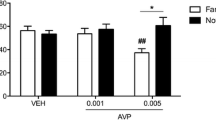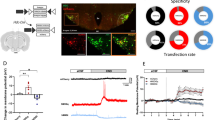Abstract
Modulation of learning and memory is one of the physiological roles that the neuropeptide cholecystokinin (CCK-8) may play. We have used a behavioural model of olfactory recognition among rats to test this hypothesis and to explore the relationship between CCK-A and CCK-B receptors and memory retention. Adult male rats form a transient memory of a juvenile congenere as indicated by a reduction in the duration of investigatory behaviour upon re-exposure 30 min after an initial exposure, but not when re-exposure is delayed until 120 min afterwards. In the present study, rats were treated after the first contact with various compounds; inhibition and facilitation of olfactory recognition were evaluated as the persistence in investigation 30 min and the decrease in investigation 120 min after pharmacological manipulations, respectively. Systemic injection of CCK-8, of a selective CCK-A agonist, or of non-peptide CCK-B antagonists (CI-988 and LY-262691) enhanced olfactory recognition. In contrast, the CCK-B selective agonist BC 264 and the tetrapeptide CCK-4 both disrupted it. Taken together with previous evidence of the detrimental effect of the non-peptide CCK-A antagonist devazepide on olfactory recognition, these results confirm and extend the hypothesis that there is a balance between CCK-A-mediated facilitative effects and CCK-B-mediated inhibitory effects on memory retention.
Similar content being viewed by others
References
Bock MG, DiPardo RM, Evans BE, Rittle KE, Whitter WL, Veber DF, Anderson PS, Freidinger RM (1989) Benzodiazepine gastrin and brain cholecystokinin receptor ligands: L-365,260. J Med Chem 32:13–16
Böhme GA, Stutzmann JM, Blanchard JC (1988) Excitatory effects of cholecystokinin in rat hippocampus: pharmacological response compatible with “central”-or B-type CCK receptors. Brain Res 451:309–318
Böhme GA, Durieux C, Stutzmann JM, Charpentier B, Roques BP, Blanchard JC (1989) Electrophysiological studies with new CCK analogs: correlation with binding affinity on B-type receptors. Peptides 10:407–414
Branchereau P, Böhme GA, Champagnat J, Morin-Surun MP, Durieux C, Blanchard JC, Roques BP, Denavit-Saubié M (1992) Cholecystokinin A and cholecystokinin B receptors in neurons of the brainstem solitary complex of the rat: pharmacological identification. J Pharmacol Exp Ther 260:1433–1440
Cahill L, McGaugh JL (1990) Amygdaloid complex lesions differentially affect retention of tasks using appetitive and aversive reinforcement. Behav Neurosci 104:532–543
Carr WJ, Yee L, Gable D, Marasco E (1976) Olfactory recognition of conspecifics by domestic Norway rats. J Comp Physiol Psychol 90:821–828
Chang RSL, Lotti VJ (1986) Biochemical and pharmacological characterization of an extremely potent and selective nonpeptide cholecystokinin antagonist. Proc Natl Acad Sci USA 83:4923–4926
Charpentier B, Durieux C, Pelaprat D, Dor A, Reibaud M, Blanchard JC, Roques BP (1988) Enzyme-resistant CCK analogs with high affinities for central receptors. Peptides 9:835–841
Crawley JN (1985) Comparative distribution of cholecystokinin and other neuropeptides. Ann NY Acad Sci 448:1–8
Dantzer R, Bluthé RM, Koob GF, Le Moal M (1987) Modulation of social memory in male rats by neurohypophyseal peptides. Psychopharmacology 91:363–368
Daugé V, Böhme GA, Crawley JN, Durieux C, Stutzmann JM, Feger J, Blanchard JC, Roques BP (1990) Investigation of behavioral and electrophysiological responses induced by selective stimulation of CCKB receptors by using a new highly potent CCK analog, BC 264. Synapse 6: 73–80
Deupree D, Hsiao S (1987) Cholecystokinin octapeptide, proglumide, and passive avoidance in rats. Peptides 8:25–28
Durieux C, Corringer PJ, Bergeron F, Roques BP (1989) [3H]pBC 264, first highly potent and very selective radioligand for CCK-B receptors. Eur J Pharmacol 168:269–270
Eichenbaum H, Otto T (1993) Odor-guided learning and memory in rats: is it “special”? Trends Neurosci 16:22–24
Fekete M, Lengyel A, Hegedüs B, Penke B, Zarandy M, toth GK, Telegdy G (1984) Further analysis of the effects of cholecystokinin octapeptides on avoidance behaviour in rats. Eur J Pharmacol 98:79–91
File SE (1985) Animal models for predicting clinical efficacy of anxiolytic drugs: social behaviour. Neuropsychobiology 13:55–62
Flood JF, Morley JE (1989) Cholecystokinin receptors mediate enhanced memory retention produced by feeding and gastrointestinal peptides. Peptides 10:809–813
Flood JF, Smith GE, Morley JE (1987) Modulation of memory processing by cholecystokinin: dependence on the vagus nerve. Science 236:832–834
Flood JF, Garland JS, Morley JE (1992) Evidence that cholecystokinin-enhanced retention is mediated by changes in opioid activity in the amygdala. Brain Res 585:94–104
Harro J, Oreland L (1993) Cholecystokinin receptors and memory: a radial maze study. Pharmacol Biochem Behav 44:509–517
Harro J, Vasar E (1991) Evidence that CCK-B receptors mediate the regulation of exploratory behaviour in the rat. Eur J Pharmacol 193:379–381
Hughes J, Boden P, Costall B, Domeney A, Kelly E, Horwell DC, Hunter JC, Pinnock RD, Woodruff GN (1990) Development of a class of selective cholecystokinin type B receptor antagonists having potent anxiolytic activity. Proc Natl Acad Sci USA 87:6728–6732
Innis RB, Snyder SH (1980) Distinct cholecystokinin receptors in brain and pancreas. Proc Natl Acad Sci USA 77:6917–6921
Itoh S, Lal H (1990) Influence of cholecystokinin and analogues on memory processes. Drug Dev Res 21:257–276
Itoh S, Takashima A, Igano K, Inouye K (1989) Memory effect of caeruleine and its analogs in active and passive avoidance responses in the rat. Peptides 10:843–848
Itoh S, Takashima A, Igana K, Maeda Y (1992a) Memory-enhancing effect of a cerulein analogue following peripheral administration in the rat. Drug Dev Res 27:377–387
Itoh S, Takashima A, Maeda Y (1992b) Memory impairments induced by peripherally administered cholecystokinin A-type receptor antagonists in rats. Drug Dev Res 26:89–99
Katsuura G, Itoh S (1986) Passive avoidance deficit following intracerebroventricular administration of cholecystokinin tetrapeptide amide in rats. Peptides 7:809–814
Lee YM, Beinborn M, McBride EW, Lu M, Kolakowski LF Jr, Kopin AS (1993) The human brain cholecystokinin-B/gastrin receptor. Cloning and characterization. J Biol Chem 268:8164–8169
Lemaire M, Piot O, Roques BP, Böhme GA, Blanchard JC (1992) Evidence for an endogenous cholecystokininergic balance in social memory. NeuroReport 3:929–932
Mailleux P, Vanderhaeghen JP (1990) Cholecystokinin receptors of A type in the human dorsal medulla oblongata and meningiomas, and of B type in small cell lung carcinomas. Neurosci Lett 117:243–247
Makovec F, Chiste R, Bani M, Pacini MA, Setnikar I, Rovati LA (1985) New glutaramic acid derivatives with potent competitive and specific cholecystokinin-antagonistic activity. Arzneimittelforschung 35:1048–1051
Mercer JG, Lawrence CB (1992) Selectivity of cholecystokinin (CCK) receptor antagonists, MK-329 and L-365,260, for axonally-transported CCK binding sites on the vagus nerve. Neurosci Lett 137:229–231
Meziane H, Devigne C, Tramu G, Soumireu-Mourat B (1993) Effects of anti-CCK-8 antiserum on acquisition and retrieval by mice in an appetitive task. Peptides 14:67–73
Moran TH, Robinson PH, Goldrich MS, McHugh PR (1986) Two brain cholecystokinin receptors: implications for behavioral actions. Brain Res 362:175–179
Palkovits M, Kiss JZ, Beinfeld MC, Williams TH (1982) Cholecystokinin in the nucleus of the solitary tract of the rat: evidence for its vagal origin. Brain Res 252:386–390
Perio A, Terranova JP, Worms P, Bluthé RM, Dantzer R, Bizière K (1989) Specific modulation of social memory in rats by cholinomimetic and nootropic drugs, by benzodiazepine inverse agonists, but not by psychostimulants. Psychopharmacology 97:262–268
Rasmussen K, Czachura JF, Stockton ME, Howbert JJ (1993) Electrophysiological effects of diphenylpyrazolidinone cholecystokinin-B and cholecystokinin-A antagonists on midbrain dopamine neurons. J Pharmacol Exp Ther 264:480–488
Ravard S, Dourish CT (1990) Cholecystokinin and anxiety. Trends Pharmacol Sci 11:271–273
Sawyer TF, Hengehold AK, Perez WA (1984) Chemosensory and hormonal mediation of social memory in male rats. Behav Neurosci 98:908–913
Schiffmann SN, Vanderhaeghen JJ (1991) Distribution of cells containing mRNA encoding for cholecystokinin in the rat central nervous system. J Comp Neurol 304:219–233
Sekiguchi R, Wolterink G, Van Ree JM (1991) Short duration of retroactive facilitation of social recognition in rats. Physiol Behav 50:1253–1256
Shiosaki K, Wel Lin C, Kopecka H, Tufano MD, Bianchi BR, Miller TR, Witte DG, Nadzan AM (1991) Boc-CCK-4 derivatives containing side-chain ureas as potent and selective CCK-A receptor agonists. J Med Chem 34:2837–2842
Squire LR (1992) Memory and the hippocampus: a synthesis from findings with rats, monkeys, and humans. Physiol Rev 99:195–231
Thor DH, Holloway WR (1982) Social memory of the male labora tory rat. J Comp Physiol Psychol 96:1000–1006
Vanderhaeghen JJ, Signeau JC, Gepts W (1975) New peptide in the vertebrate CNS reacting with antigastrin antibodies. Nature 257:604–605
Vasar E, Harro J, Lang A, Pôld A, Soosaar A (1991) Differential involvement of CCK-A and CCK-B receptors in the regulation of locomotor activity in the mouse. Psychopharmacology 105:393–399
Voits M, Gerhardt P, Fink H, Huston JP (1993) The effects of cholecystokinin fragments on learning in rats. Naunyn Schmiedeberg's Arch Pharmacol Suppl 347:R127
Wank SA, Pisegna JR, De Weerth A (1992) Brain and gastrointestinal cholecystokinin receptor family: structure and functional expression. Proc Natl Acad Sci USA 89:8691–8695
Author information
Authors and Affiliations
Rights and permissions
About this article
Cite this article
Lemaire, M., Böhme, G.A., Piot, O. et al. CCK-A and CCK-B selective receptor agonists and antagonists modulate olfactory recognition in male rats. Psychopharmacology 115, 435–440 (1994). https://doi.org/10.1007/BF02245565
Received:
Revised:
Issue Date:
DOI: https://doi.org/10.1007/BF02245565




